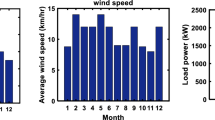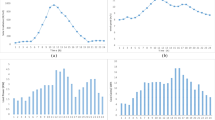Abstract
Integrating photovoltaic (PV) systems and wind energy resources (WERs) into microgrids presents challenges due to their inherent unpredictability. This paper proposes deterministic and probabilistic sustainable energy management (SEM) solutions for microgrids connected to the main power system. A prairie dog optimization (PDO) algorithm is utilized to optimize energy utilization, grid stability, and the integration of renewable energy resources (RERs). The algorithm addresses cost reduction, voltage profile improvement, and optimal sizing of RERs. Simulation results demonstrate that incorporating grid-connected PV units and wind turbines (WTs) strategically reduces total costs and enhances system performance. The PDO method outperforms other optimization algorithms, such as Equilibrium Optimizer (EO) and Whale Optimization Algorithm (WOA), in SEM for microgrids due to its consistent convergence properties. Under deterministic settings, optimal integration of RERs reduces overall costs by 52%, with a significant 7.49% improvement in voltage profile index. In probabilistic scenarios, a remarkable 63.68% reduction in overall costs and a 7.51% enhancement in voltage stability index are achieved. These findings demonstrate the effectiveness of PDO in addressing SEM challenges in microgrid environments, showcasing superior performance over existing optimization techniques.















Similar content being viewed by others
Availability of data and materials
Figures: Microsoft Visio 2007, MATLAB/ Simulink, Tables: Microsoft Word.
References
Akorede MF, Hizam H, Pouresmaeil E (2010) Distributed energy resources and benefits to the environment. Renew Sustain Energy Rev 14:724–734
Riaz M, Awan MAI, Khalil L, Mushtaq I, Bhatti KL, Siddique M (2020) Economically efficient, environment friendly & power stack shed reduction energy management system by utilizing renewable energy resources for remote hilly areas of Pakistan. Mater Today Proc 9:1–5
Cao Y et al (2019) Optimal operation of CCHP and renewable generation-based energy hub considering environmental perspective: an epsilon constraint and fuzzy methods. Sustain Energy Grids Netw 20:100274
Wang Z et al (2021) A new configuration of autonomous CHP system based on improved version of marine predators’ algorithm: a case study. Int Trans Electr Energy Syst 31(4):e12806
Wang X, Mao X, Khodaei H (2021) A multi-objective home energy management system based on internet of things and optimization algorithms. J Build Eng 33:101603
Song C et al (2021) A review of optimal energy management strategies using machine learning techniques for hybrid electric vehicles. Int J Automot Technol 22:1437–1452
Arockiaraj S (2022) Energy management system based on automatic intelligent controller for grid connected commercial LOADS. J Controll Convert 1–7
Rezaie M et al (2022) Model parameters estimation of the proton exchange membrane fuel cell by a modified golden jackal optimization. Sustain Energy Technol Assess 53:102657
Sharma P, Bora BJ (2022) A review of modern machine learning techniques in the prediction of remaining useful life of lithium-ion batteries. Batteries 9(1):13
Guo Y et al (2020) An optimal configuration for a battery and PEM fuel cell-based hybrid energy system using developed Krill herd optimization algorithm for locomotive application. Energy Rep 6:885–894
Gopi A et al (2022) Weather impact on solar farm performance: a comparative analysis of machine learning techniques. Sustainability 15(1):439
Khalil Pour M, et al (2013) Optimal bidding on congestion management in the competitive market using artificial bee colony algorithm, In: The 1st Iranian energy association, in Persian
Sun L et al (2021) Exergy analysis of a fuel cell power system and optimizing it with fractional-order coyote optimization algorithm. Energy Rep 7:7424–7433
Battula AR, Vuddanti S (2023) Distributed control strategy for secondary frequency regulation with EV demand aggregation and delay compensation in AC unbalanced microgrid. Electric Power Syst Res 225:109782. https://doi.org/10.1016/j.epsr.2023.109782
Mazidi M, Zakariazadeh A, Jadid S, Siano P (2014) Integrated scheduling of renewable generation and demand response programs in a microgrid. Energy Convers Manag 86:1118–1127
Kamel RM (2014) Effect of wind generation system types on Micro-Grid (MG) fault performance during both standalone and grid connected modes. Energy Convers Manag 79:232–245
Kamel RM, Nagasaka K (2015) Effect of load type on standalone micro grid fault performance. Appl Energy 160:532–540
Dawoud SM, Lin X, Okba MI (2018) Hybrid renewable microgrid optimization techniques: a review. Renew Sustain Energy Rev 82:2039–2052
Aghajani G, Ghadimi N (2018) Multi-objective energy management in a micro-grid. Energy Rep 4:218–225
Ahmed D, Ebeed M, Ali A, Alghamdi AS, Kamel S (2021) Multi-objective energy management of a micro-grid considering stochastic nature of load and Renewable energy resources. Electronics 10(4):403
Motevasel M, Seifi AR (2014) Expert energy management of a micro-grid considering wind energy uncertainty. Energy Convers Manag 83:58–72
Motevasel M, Seifi AR, Niknam T (2013) Multi-objective energy management of CHP (combined heat and power)-based micro-grid. Energy 51:123–136
Moghaddam AA, Seifi A, Niknam T (2012) Multi-operation management of a typical micro-grids using particle swarm optimization: a comparative study. Renew Sustain Energy Rev 16:1268–1281
Wu LZ, Hao XH (2014) Multi-objective operation optimization of a micro-grid using modified honey bee mating optimization algorithm. Appl Mech Mater 494–495:1593–1597
Elattar EE, ElSayed SK (2020) Probabilistic energy management with emission of renewable micro-grids including storage devices based on efficient salp swarm algorithm. Renew Energy 153:23–35
Roy K, Mandal KK, Mandal AC (2019) Ant-Lion Optimizer algorithm and recurrent neural network for energy management of micro grid connected system. Energy 167:402–416
Kamel S, Ramadan A, Ebeed M, Nasrat L, Ahmed MH (2019) Sizing and evaluation analysis of hybrid solar-wind distributed generations in real distribution network considering the uncertainty. In: Proceedings of the 2019 international conference on computer, control, electrical, and electronics engineering (ICCCEEE), Khartoum, Sudan, 21–23 September 2019; pp 1–5
Kamankesh H, Agelidis VG, Kavousi-Fard A (2016) Optimal scheduling of renewable micro-grids considering plug-in hybrid electric vehicle charging demand. Energy 100:285–297
Zolfaghari M, Ghaffarzadeh N, Ardakani AJ (2019) Optimal sizing of battery energy storage systems in off-grid micro grids using convex optimization. J Energy Storage 23:44–56
Mohseni S, Brent AC, Burmester D (2019) A demand response-centred approach to the long-term equipment capacity planning of grid-independent micro-grids optimized by the moth-flame optimization algorithm. Energy Convers Manag 200:112105
Faramarzi A, Heidarinejad M, Stephens B, Mirjalili S (2020) Equilibrium optimizer: A novel optimization algorithm. Knowl Based Syst 191:105190
Özkaya H, Yıldız M, Yıldız AR, Bureerat S, Yıldız BS, Sait SM (2020) The equilibrium optimization algorithm and the response surface-based metamodel for optimal structural design of vehicle components. Mater Test 62:492–496
Abdul-hamied DT, Shaheen AM, Salem WA, Gabr WI, El-sehiemy RA (2020) Equilibrium optimizer based multi dimensions operation of hybrid AC/DC grids. Alex Eng J 59:4787–4803
Abdel-Basset M, Chang V, Mohamed R (2020) A novel equilibrium optimization algorithm for multi-thresholding image segmentation problems. Neural Comput Appl 1–34
Shaheen A, Elsayed A, El-Sehiemy RA, Abdelaziz AY (2021) Equilibrium optimization algorithm for network reconfiguration and distributed generation allocation in power systems. Appl Soft Comput 98:106867
Gao Y, Zhou Y, Luo Q (2020) An efficient binary equilibrium optimizer algorithm for feature selection. IEEE Access 8:140936–140963
EI-Bidairi KS, Nguyen HD, Jayasinghe S, Mahmoud TS (2018) Multiobjective intelligent energy management optimization for grid-connected microgrids. In: Proceedings of the 2018 IEEE international conference on environment and electrical engineering and 2018 IEEE industrial and commercial power systems Europe (EEEIC/I&CPS Europe), Palermo, Italy, 12–15 June 2018; pp 1–6
Mahmud K, Sahoo A (2019) Multistage energy management system using autoregressive moving average and artificial neural network for day-ahead peak shaving. Electron Lett 55:853–855
Khan MW, Wang J, **ong L (2021) Optimal energy scheduling strategy for multi-energy generation grid using multi-agent systems. Int J Electr Power Energy Syst 124:106400
Divakaran AM, Hamilton D, Manjunatha KN, Minakshi M (2020) Design, development and thermal analysis of reusable Li-ion battery module for future mobile and stationary applications. Energies 13:1477
Sundaram MM, Appadoo D (2020) Traditional salt-in-water electrolyte vs. water-in-salt electrolyte with binary metal oxide for symmetric supercapacitors: capacitive vs. faradaic. Dalton Trans 49:11743–11755
Minakshi M, Mitchell DR, Jones RT, Pramanik NC, Jean-Fulcrand A, Garnweitner G (2020) A hybrid electrochemical energy storage device using sustainable electrode materials. ChemistrySelect 5:1597–1606
Buchibabu P, Somlal J (2023) Green energy management in DC microgrids enhanced with robust model predictive control and muddled tuna swarm MPPT. Electr Eng. https://doi.org/10.1007/s00202-023-02127-4
Rezaei M, Dampage U, Das BK, Nasif O, Borowski PF, Mohamed MA (2021) Investigating the impact of economic uncertainty on optimal sizing of grid-independent hybrid renewable energy systems. Processes (Basel) 9(8):1468
Wang C, Wang L, Deng X, Liu J, Guo D (2023) Scenario-based line switching for enhancing static voltage stability with uncertainty of renewables and loads. Int J Electr Power Energy Syst 145(108653):108653
Ezugwu AE, Agushaka JO, Abualigah L, Mirjalili S, Gandomi AH (2022) Prairie dog optimization algorithm. Neural Comput Appl 34(22):20017–20065
Gampa SR, Das D (2015) Optimum placement and sizing of DGs considering average hourly variations of load. Int J Electr Power Energy Syst 66:25–40
Sultana S, Roy PK (2014) Optimal capacitor placement in radial distribution systems using teaching learning-based optimization. Int J Electr Power Energy Syst 54:387–398
Moradi MH, Abedini M, Tousi SR, Hosseinian SM (2015) Optimal siting and sizing of renewable energy sources and charging stations simultaneously based on Differential Evolution algorithm. Int J Electr Power Energy Syst 73:1015–1024
Zhang Y, Ren S, Dong ZY, Xu Y, Meng K, Zheng Y (2017) Optimal placement of battery energy storage in distribution networks considering conservation voltage reduction and stochastic load composition. IET Gener Transm Distrib 11:3862–3870
Soni J, Bhattacharjee K (2023) Multi-objective dynamic economic emission dispatch integration with renewable energy sources and plug-in electrical vehicle using equilibrium optimizer. Environ Dev Sustain 26(4):8555–8586
Yan Z, Duan X, Chang Y, Xu Z, Sobhani B (2023) Optimal energy management in smart buildings with electric vehicles based on economic and risk aspects using developed whale optimization algorithm. J Clean Prod 415(10):137710
Funding
There is no funding body involved in this article.
Author information
Authors and Affiliations
Contributions
P. Buchibabu-Data collection, and Manuscript editing, Jarupula Somlal-Manuscript preparation, writing.
Corresponding author
Ethics declarations
Conflict of interest
There are no competing interests involved in this manuscript. There is no financial funding involved in this manuscript.
Ethical approval
We declare that this manuscript is original, has not been published before, and is not currently being considered for publication elsewhere and there are no conflicts of interest for this publication.
Additional information
Publisher's Note
Springer Nature remains neutral with regard to jurisdictional claims in published maps and institutional affiliations.
Rights and permissions
Springer Nature or its licensor (e.g. a society or other partner) holds exclusive rights to this article under a publishing agreement with the author(s) or other rightsholder(s); author self-archiving of the accepted manuscript version of this article is solely governed by the terms of such publishing agreement and applicable law.
About this article
Cite this article
Buchibabu, P., Somlal, J. Sustainable energy management in microgrids: a multi-objective approach for stochastic load and intermittent renewable energy resources. Electr Eng (2024). https://doi.org/10.1007/s00202-024-02488-4
Received:
Accepted:
Published:
DOI: https://doi.org/10.1007/s00202-024-02488-4




